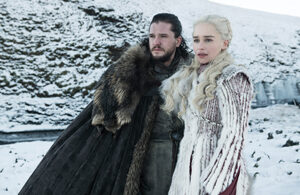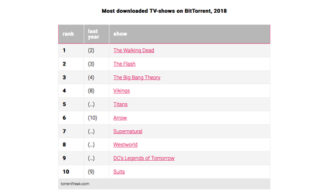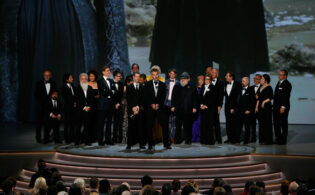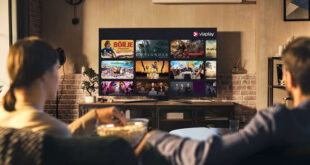PREMIUM: Emilia Clarke discusses playing the role of Daenerys Targaryen in the megahit Game of Thrones, which was the big winner at this year’s Emmys.
WS: Daenerys has transformed from a fearful girl to a very determined Khaleesi. How do you balance her vulnerability against her determination?
CLARKE: Well, I’ve been very lucky because I’ve been with her from the beginning. Unlike many characters that you read as an actor, you see Daenerys change from the beginning where she is fearful and timid and pushed upon by the strength of the male-dominated society that she finds herself in. I got to go from the very beginning, so I got to be timid and frightened and scared, and then have these gorgeous scenes like when she first stops Viserys, her brother, from slapping her. And then marrying Khal Drogo and the strength he gave her so she could feel like a woman for the first time. Then taking it all the way to the end of that season, when giving birth to dragons and surviving fire, so it’s never been a very conscious decision as to how I balanced the two. It’s been more a matter of taking each thing as it comes and playing the truth of that, and the logical conclusion is the balance of vulnerability and strength that she has. Every choice that Daenerys makes from here on out is because she’s felt what it is to be sold. She’s felt what it is to be abused, and she’s also felt what it is to take back what is hers, and stand there with balls bigger than any guy in the room!
WS: Absolutely. I imagine that in real life you have not been a queen, nor have you led an army! What do you draw upon when you’re in those scenes?
CLARKE: Oh my goodness, we are so fortunate with Game of Thrones that every single part of our show—the set, the costumes, the detail that goes into every single department—really means that there’s not a huge amount of acting required when placed into that environment. You get to say the genius words that David [Benioff] and Daniel [Weiss] have written, inspired by George R. R. Martin’s genius story. It all just falls into place perfectly when you allow yourself to be as present in that moment as possible. What I’m saying is, I’m not really sure how I find the strength that she has! It’s all Daenerys—it just feels very natural.
WS: What have you learned about acting from the experience on Game of Thrones and from the other actors on the show?
CLARKE: So much. So much. When I was at drama school we had one acting for camera class [and they] just showed us a Michael Caine video that told us how to hit our mark. I really didn’t have a lot of camera experience before coming into this. I have learned everything that I know about acting for camera and about how a set works and operates and the best kind of behavior that you can have as an actor within that set, in a very safe environment. I feel very safe and helped by absolutely every member of the cast and crew, really. Especially since I had Iain Glen [who plays Jorah Mormont] as my confidant for so long. He really did spend a lot of his time mentoring me, Emilia, as much as Jorah does mentoring Daenerys. My goodness, he knows the ropes! Many an epiphany after a discussion with Mr. Iain Glen!
WS: Did you read George R. R. Martin’s books as part of your preparation, and how much of the mythology did you feel you needed to know?
CLARKE: I really did. The first book especially was akin to a Bible for me. I took it everywhere, absolutely everywhere, and reread and reread and reread. Then, as I grew in confidence after that first season, I have leant on the books less. Mainly because to understand the work you really need to pay homage to and understand the world that George R. R. Martin has created, but as the television show has moved on apace, as an actor it is important for you to be as present on the set as you are thinking about the book. Otherwise you’re doing a disservice to the both of them, because you could spend too much time thinking about what affected you in the narration of one of the chapters that George has written, then you’re suddenly forgetting that it’s 4 o’clock in a Croatian desert with [hundreds of] people and having David and Dan asking when I’m gonna say my line! So we’ve grown to a place of accepting the Game of Thrones world, the show, as the new Bible.
WS: Game of Thrones is cinematic in its production values. Give us a sense of what it’s like to be on the set, especially in the huge scene when you met the Unsullied warriors.
CLARKE: Just as frightening as it looks. Truly, I really mean it. It’s really one of the most daunting scenes I’ve had, speaking at length in one of our made-up languages to a lot of people. You truly have to take on every memory you have of politicians speaking at rallies, or in Congress, or Parliament, or whatever it is, and in that moment, think, Emilia, get the attention of 300, 400 people. That, again, does so much for not needing to be consciously thinking about acting. You’re kind of very much in the moment, and reacting to how they are, and catching someone’s eye and seeing them wander, you’re like, Wait! I’ve got to get them back! So it’s definitely incredibly daunting, and they’re always the scariest scenes. Especially in that heat, with that wig!
WS: Daenerys has a very strong sense of justice, and there was that great line, I’m paraphrasing, when your advisor tells you, “Sometimes the best answer to justice is mercy,” and you said, “I will answer justice with justice.” Do Daenerys, and other characters on Game of Thrones, find themselves doing bad things even if they mean well?
CLARKE: Yes, it’s the difference between being an idealist and being a realist. I think the best leaders are a heavy mixture of both, and so while there might be some questionable tactics, you need to make a choice and stick with it. Her choice is the freedom of those in slavery, and getting back to her rightful place on the throne, so that she can administer as much good [as possible] and even out the enormous gap between the rich and the poor, at the sacrifice of herself as a person. Daenerys sees herself much more as Elizabeth I, being married to her job, to her role, to her destiny, as opposed to thinking, I’d like to find the man of my dreams and have lots of children. At the end of season one, when she says goodbye to Khal Drogo, she knows that she’s saying goodbye to any kind of selfish want, and is really looking out for the people.
WS: How many times do you meet people who say they call their significant other “My sun and moon”?
CLARKE: Oh, it’s my favorite thing to hear. I love it. I absolutely love it!
WS: Even though Game of Thrones is set in the past, what contemporary themes do you think it presents and addresses?
CLARKE: Ultimately, the core of Game of Thrones is power and the struggle for power—who has it, who doesn’t. Why do you want it? What good or bad can you do with it? That is always going to find a relevant counterpart to our modern society, because, you know, power and money—they ain’t going nowhere! So [with those two themes] there are always a million ways that you can find counterpoints to modern society. I think that’s why people enjoy the show so much, making it even more relevant to today, and that that’s what keeps it really exciting. I’m genuinely not comparing [Game of Thrones to Shakespeare] at all, but good writing—the most famous example of good writing is Shakespeare, and you can read Hamlet and find it relevant today because it’s discussing themes that are the product of human nature, as opposed to being the product of 2015 or 1912.
WS: A word about her babies. What are the scenes with the dragons like?
CLARKE: Well they’re always wonderful, because they’re always incredibly heartfelt. You just have to get rid of any embarrassment as an actor, and really harness as much conviction as you can to truly care about the big green sock while the rest of the crew is looking at you earnestly discussing your love of this big green thing! But I do have a huge soft spot for my babies! It’s just as well because the scenes are so abstract when you film them that you have to kind of zone out and see what the audience will see.
WS: At the end of season five, we see Daenerys in a position where she’s the only person she can trust. Do you feel she has made mistakes as a leader?
CLARKE: Daenerys is in a bit of a precarious situation, probably the most precarious situation she’s been in since season one, really, because she is without a soul and without a hope, and she is being surrounded by a lot of rather angry-looking Dothraki. Yes, I think that her mettle is going to be tested even more this time, and in a way it might be freeing because she’s out of the confines of the day-to-day politics of being a ruler of a land that isn’t hers, and trying to appease both the rich and the poor. Now she’s in this live-or-die situation with people who don’t deal with the monetary value of things, but deal more with, You’re a man and I’m a woman, and that’s what we’re discussing here. So she has a golden opportunity to prove her worth, and I think the outcome will be satisfying in a way that hopefully she won’t die. That’s what I am hoping for! I think she’s made a ton of mistakes, but a brilliant aspect of Daenerys is that she never makes the same mistake twice, and she always learns, so I think this will be the most exciting lesson that she will have come across.
WS: What was it like to finally have the chance to act with Peter Dinklage, who plays Tyrion Lannister?
CLARKE: It was amazing. I was an absolute fan girl; I just couldn’t get over it! That was probably the most nervous day at work I’ve had in five years. It was ridiculous, I was like, Ooh, I’m going to have to act with Peter! I know him, we get on really well, but just the idea of me acting with Tyrion, I just completely fanned out! It took a while to get into the scene, because I kept having to pinch myself that these two characters [would have a scene together]. It was incredible because you get used to acting with certain people that you work with regularly. I’m a fan of the show, I watch the show avidly, so it was just wonderful being tested as an actor in such a different way through acting with Peter, because he, as the character and as an actor, really keeps you on your toes. You want the same quick wit and intelligence that he just oozes, and I just think he’s marvelous and wonderful. It was a scene I was definitely most proud of.
WS: We’re hoping to see more of the two of you together next season!
CLARKE: Well, me too!
WS: Some critics have said that the show has too much violence and too many scenes of rape. How would you answer them?
CLARKE: Violence and rape are sorry aspects of our society, and when having this discussion about what Game of Thrones is saying about violence and rape, we need to discuss whether we’re talking about the Western world or the rest of the world, because it’s two different discussions. I also think that Game of Thrones is depicting a moment in history where the rights of men and women were very different, and it’s definitely commenting upon that. I think it’s good that it’s bringing those topics to the table for people to discuss, but I don’t think that the show, myself, or any of the actors involved believe that it belies our true feelings about the real world—the violence and rape that happens day to day. Ultimately it is a fantasy show. Yes, it’s got a huge amount of shock factor, but that really is characteristic of the show in trying to depict a reality of that time.
WS: Because in real life you do not look like Daenerys, do you still have a semblance of privacy when you go to restaurants, or shopping, or whatever?
CLARKE: Yeah! I’m really lucky. It’s weird—airports are a nightmare. In airports I can’t seem to come out of the loo without someone going, “Oh my God!” I went to this literary festival in Cornwall, and I was there for two days, wandering around with my pint of cider and I just had two or three people the whole time [come up to me]. They were terribly British and middle class about it and really funny, apart from one guy who said, “Aren’t you ‘What’s Her Tits’ of that show?” and I was like, “What name? What name is ‘What’s Her Tits’?” and he was like “I don’t know, ‘What’s Her Tits’” and I was like “Oh, bad for you, I don’t know who you’re talking about.” I was mildly insulted being referred to as “What’s Her Tits!” But other than that I really am so lucky to have an incredibly normal life outside of filming. I’m very happy with that.
WS: The other benefit of not physically resembling Daenerys is that you’re not typecast. People wouldn’t immediately associate you with Daenerys if you play another character, right?
CLARKE: Exactly, and aside from the private life aspect, that is one the most wonderful things. Because I hate it more than anything when I go and watch a movie and I’m thinking about the divorce that actor just had or the kids that they have. Just knowing so much about their personal life stops you from suspending your disbelief. But if you can try to look different then that immediate visual association is null and void, and you can hopefully get commented upon for your acting rather than anything else.



